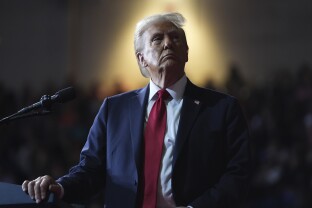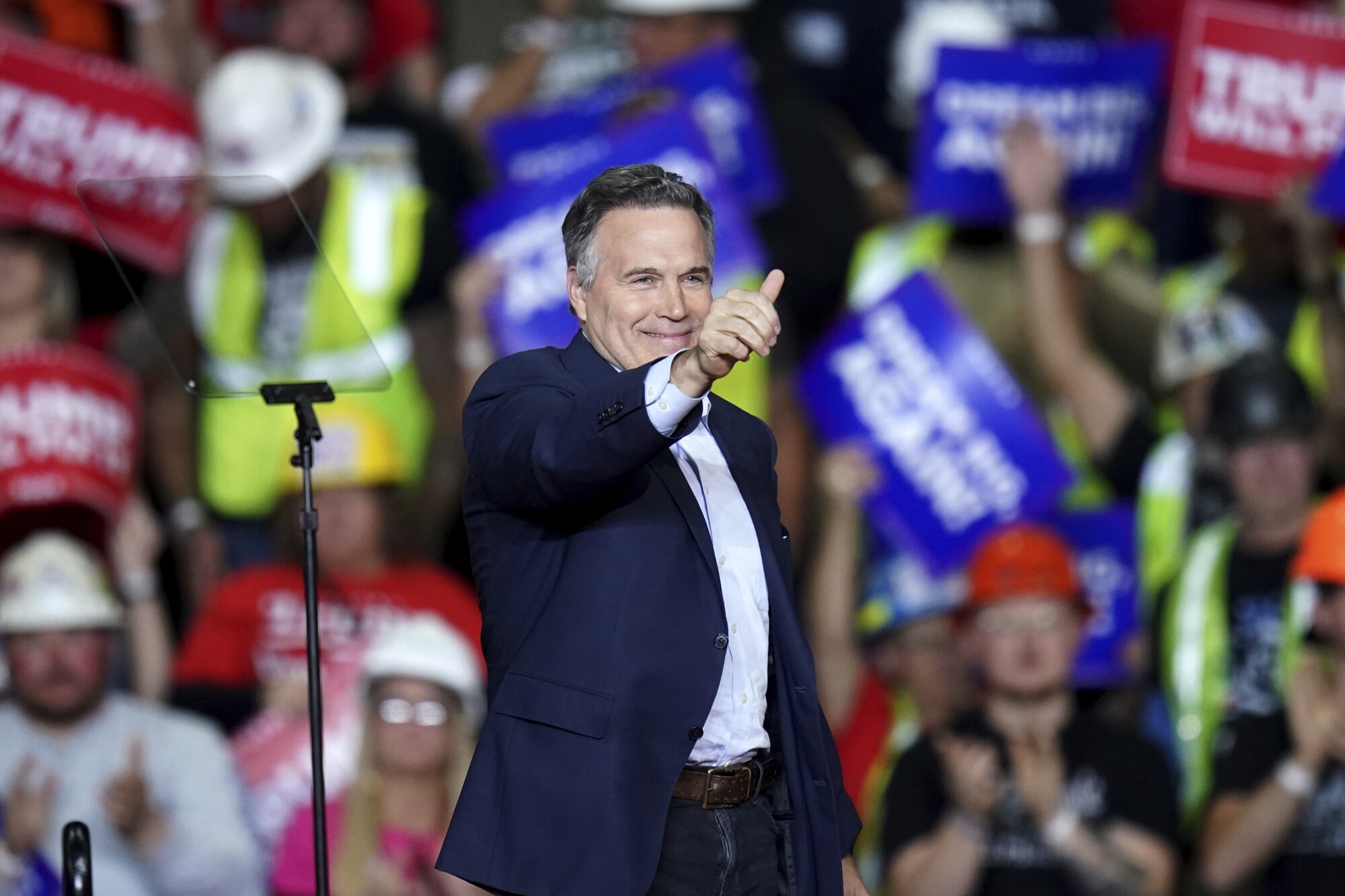There’s at least one thing almost every Republican candidate who ran this year had in common: They got fewer votes than Donald Trump.
In states across the country, the president-elect performed better than Republican candidates running for Congress and other statewide positions, often exceeding their support by enough votes to make the difference between victory and defeat. Trump did so much better, in fact, that he scored a decisive victory in the presidential race even as Republicans made significant but still relatively modest gains in the Senate and little new headway in the House.
The over-performance was a reversal from his two previous presidential runs, when Trump frequently received fewer votes than GOP candidates running down the ballot. And it raises a provocative question for a party that has spent much of the last decade trying to carve out ways to differentiate itself from its polarizing leader: Should Republican candidates in future elections try to be more like Donald Trump?
“You can’t authentically replicate the Trump persona,” Giancarlo Sopo, a Republican strategist, said. “But what you can do is take a look at parts of his policies that do appeal to people and embrace them.”
Sopo and other party operatives cautioned that replicating Trump’s appeal is, at some level, impossible. They add that amid an ongoing postelection assessment from the party, they aren’t yet exactly sure why the former president did better than his Republican allies.
But that Republicans are even contemplating such a question is a testament to how Trump is poised to further re-create the party in his own image, driven by his popularity with voters beyond even the Republican base.
“Candidates matter, and that’s the most important thing,” Alex Stroman, a Republican strategist, said. “Donald Trump is a super candidate and is finally maybe getting recognition for that.”
Trump’s strong returns compared to many Republican lawmakers, especially in the Senate, is a reason they might find it difficult to resist even the most controversial nominations for his cabinet, including his selection of Fox News host Pete Hegseth as secretary of defense, former Rep. Tulsi Gabbard as director of national intelligence and Rep. Matt Gaetz for attorney general.
Trump’s 2024 election results speak for themselves, especially in states with marquee Senate races that doubled as presidential battlegrounds. In Wisconsin, for instance, he received about 50,000 more votes than GOP Senate nominee Eric Hovde, winning the state by 1 percentage point while Hovde lost it by roughly 1 percentage point. In Pennsylvania, the former president outperformed Republican Senate candidate Dave McCormick by nearly 150,000 votes. (Hovde lost his race against Democratic Sen. Tammy Baldwin, while McCormick defeated Democratic Sen. Bob Casey.)
In Nevada, the gap was even bigger as a share of the overall vote: Trump won a majority of voters, per vote tallies posted Thursday, besting Kamala Harris by more than 40,000 votes. But GOP Senate nominee Sam Brown received just over 46% of the vote, trailing Trump’s vote total by roughly 75,000 votes.
In those three states, GOP Senate candidates took on entrenched Democratic incumbents, who traditionally outrun their party’s top of the ticket. But even in open-seat contests, where the GOP candidates were at less of a disadvantage, Trump still won more votes.
In Michigan, Trump won about 2.8 million votes, with 49.7% of the vote, on his way to victory. But GOP Senate nominee Mike Rogers managed fewer than 2.7 million votes, losing with just 48.3% of the vote.
The difference was larger in another open-seat race in Arizona, where Trump was on track to better Republican Senate nominee Kari Lake by more than 4 percentage points, winning more than 52% of the vote compared to her total of less than 48%. With 99% of precincts reporting Thursday, Lake had received 200,000 fewer votes than Trump.
The Republican presidential nominee outran GOP Senate candidates in nearly every competitive Senate race, in fact, including in Montana, Ohio, Texas, Florida and Nebraska.
Comparisons to House races, where results of the presidential race were not always immediately known, are more difficult. But in at least one key race, in Maine’s 2nd Congressional District, Trump won the district’s lone electoral vote easily, with nearly 53% of the vote, while the GOP House nominee appeared to fall short of defeating Democratic Rep. Jared Golden.
In North Carolina, Trump performed better than not only scandal-plagued Republican gubernatorial nominee Mark Robinson, but also Republican candidates down the ballot like attorney general nominee Dan Bishop. The difference helped Democrats in the state win a handful of competitive races even as Trump won a relatively comfortable majority of the vote in the presidential contest.
Trump hadn’t fared nearly as well compared to other Republican candidates during his prior campaigns, when GOP contenders frequently earned more votes than he did.
In 2016, Trump underperformed Republican Senate nominees in swing states like Pennsylvania, Florida and New Hampshire. That year, GOP Sen. Ron Johnson easily outran Trump in Wisconsin, winning 50.2% of the vote while Trump received only 47.8% of the vote.
The outcomes were more mixed in 2020. But Republican Senate nominees like John James in Michigan and Susan Collins in Maine still received a higher share of the vote than Trump that year.
Trump did better this year, according to veteran Republican strategist Brad Todd, in part because many of his former critics, including those within the GOP, had reconciled with him by 2024.
“And part of it was because they decided they had more to worry about with the Democrats,” Todd said.
Republican strategists cautioned that a complete assessment of where and why Trump did better than other GOP candidates remains in process.
Some also point out that, even this year, there were multiple examples of Republicans who performed much better than the president-elect, citing Rep. Don Bacon in Nebraska’s 2nd Congressional District, Senate nominee Larry Hogan in Maryland and gubernatorial nominee Kelly Ayotte in New Hampshire. All candidates exceeded Trump’s vote total in the suburbs, where he has usually struggled the most.
But Trump’s overperformance was also hardly a surprise to many GOP strategists in the weeks leading up to the election. The National Republican Congressional Committee, the House GOP’s political arm, issued a preelection memo touting the former president’s popularity as the top reason it was poised to retain a congressional majority.
His popularity, the memo said, would help counteract House Democrats’ heavy spending advantage in many races, one reason GOP strategists say their candidates often underperformed Trump. Many Democratic Senate candidates, like Baldwin and Casey, had also developed specialized appeal to their states, winning reelection multiple times and tailoring their message to their state’s specific demographics.
Republicans are set to gain four seats in the Senate, boosting their membership from 49 members to a majority-making 53. The outcome of several key House races remains uncertain, but Republicans will retain their majority narrowly.
In Wisconsin, that background and appeal helped Baldwin perform better among the state’s rural voters and farming communities, according to one GOP strategist who reviewed the state’s election results.
Todd, who advised the successful McCormick campaign, said Casey did better with blue-collar men, though the differences between the Senate campaign and Trump’s campaign were overall minute.
“We did a little bit better with college men. He did better with non-college men,” Todd said. “That’s pretty much it.”
Republicans say they suspect that many new voters who turned out in 2024, a cohort of young men, backed Trump but potentially left the rest of their ballot blank. Trump’s campaign aggressively courted those voters during the campaign, trying to persuade many of them to cast a ballot for the first time.
“He draws people to the polls who would otherwise not vote,” Sopo said. “Your typical podcast bro does not care about his local Senate race — but he will show up and vote for Trump.”
“Trump embodies a middle finger to the cultural establishment,” Sopo added. “So if you don’t like your corporate DEI department or the excessively politically correct HR lady, you’re going to channel that energy through him. He’s a proxy for those frustrations.”
Winning over voters who turned out for Trump but ignored other GOP candidates should be a goal for the party in future elections, said GOP strategists, adding that they could help the party win a multitude of swing states and battleground districts.
That also might be easier said than done, they said, especially for candidates who try to emulate the brash personality of perhaps the most unique presidential candidate in recent American history.
“If you model yourself on Trump, or try to be a mini-me, it’s not going to have the same authenticity,” said David Urban, a former Trump campaign adviser. “It’s not going to be authentic.”
Republican candidates, like Lake in Arizona, who did seem to embrace Trump the most also suffered the worst defeats last week.
But Republicans nonetheless urged the party to take some lessons from Trump’s victory. They focused, for instance, on his campaign’s emphasis on finding nontraditional Republican voters, a strategy that saw him making appearances on podcasts and campaigning in solidly blue states like New York and California.
The influx of younger and more working-class voters into the GOP gives the party a chance to win voters who campaigns might otherwise ignore, strategists said.
“Candidates have to understand this shift and make sure they’re reaching out outside these traditional Republican constituencies, because it certainly worked for Donald Trump,” Stroman said.
Other operatives cited his professed support for entitlement programs like Medicare and Social Security as a policy platform for others to adopt.
Todd also praised Trump and his campaign’s willingness to attack Democrats over issues like transgender athletes in school sports, which he said has the support of four-fifths of the public but scares away too many Republicans. That boldness should be embraced by other Republicans, he said.
“When you see the number 80/20, you have to believe it,” Todd said. “And the Trump campaign was willing to go to the 80/20 issue that wasn’t in the normal matrix of issues, and that’s a lesson.”
—
Alex Roarty is a reporter at NOTUS.
Sign in
Log into your free account with your email. Don’t have one?
Check your email for a one-time code.
We sent a 4-digit code to . Enter the pin to confirm your account.
New code will be available in 1:00
Let’s try this again.
We encountered an error with the passcode sent to . Please reenter your email.





